Business schools have produced some of the most successful startups of the last decade. Instagram, for example, was incubated on-campus at Stanford Graduate School of Business. Internet meme platform 9gag is a product of the accelerator at Hong Kong University. It’s natural to wonder which of tomorrow’s biggest businesses will have originated on MBA campuses.
To find out some answers, we reached out to the world's top business schools to get their nominations for the MBA Startups To Look Out For in 2020.
From insect farming to breastfeeding, the results were wide-ranging, so we’ve split our startups into seven categories:
We’ve also highlighted some of the ventures for our very own awards: Impactful Innovation, Green Leadership, Biggest Valuation, and the BusinessBecause MBA Startup of 2020, which you can read more about in our dedicated feature. For all our award winners, just look out for an orange sticker on the company photo below!
Category: Energy & sustainability
INSEACT
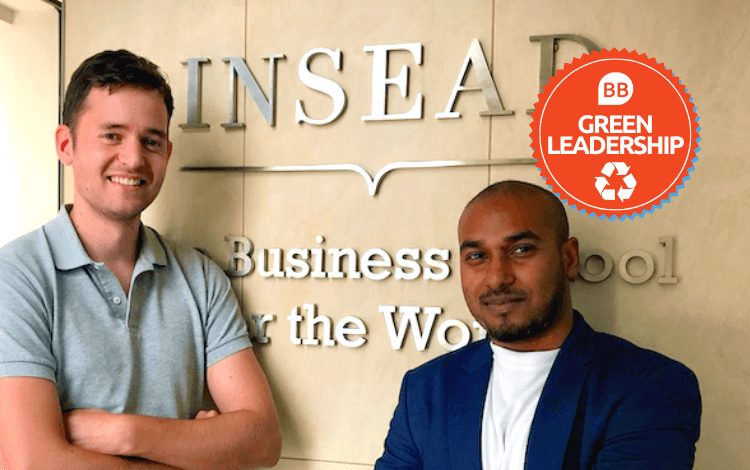
Who: Tim van Vliet, cofounder (pictured left)
School: INSEAD, class of 2019
Valuation: We are targeting a $100M valuation within three to four years.
Investment: No formal round raised yet. We raised €35,000 [$38,600] from the INSEAD Venture Competition (IVC) and €5,000 [$5,500] from INSEAD Social Impact Award.
What is your business and what does it do?
INSEACT addresses the world’s growing protein demand. We produce fish feed made of protein powder derived from insects we farm.
The impact is that we save wild fish, reduce CO2 emissions, and feed the world. It’s a more sustainable, reliable, and competitive nutritional product than current fishmeal.
How has your MBA helped you develop your business? How did the idea come about?
My Samoan fishermen family couldn’t make a living any longer due to overfishing. So, we had to find a solution.
We realized that most of the wild fish caught is used for fish feed. Insect-rearing provides a sustainable and cost-effective alternative. Feeding the insects with recycled palm oil waste makes for a circular solution.
We found an inspiring mentor in Andre Calmon, Professor of Technology and Operations Management.
Then, winning the INSEAD Venture Competition (IVC) among 200+ participants was an amazing trigger for us. We quickly got to sit down with renowned investors and potential partners. There would be no INSEACT without INSEAD.
Where are you at right now? What are your plans for the future?
We plan to start construction of a mass scale insect factory, the largest of its kind in Asia, within 12 to 18 months.
We are working closely with European companies that have advanced technology as we wish to accelerate our market entry through cooperation with one of those companies.
Soon, we will also be running trials as well to optimize the agricultural side-streams. We will also start working with fish feed manufacturers.
Within 6 months we should be raising our first round of funding. In the meantime, we’re self-funded.
A2P Energy
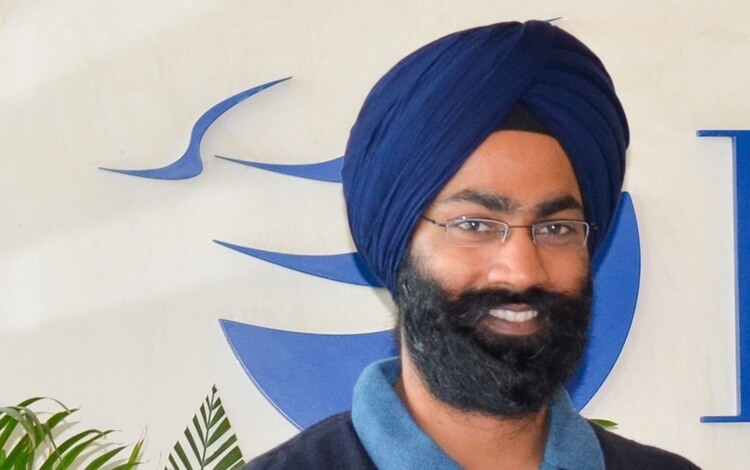
Who: Sukhmeet Singh, founder and CEO
School: Indian School of Business (ISB), class of 2007
Valuation: TBC
Investment: We have not taken any investment but we have won a few grants, for example #GlobalProsperityChallenge and #GlobalMakerChallenge.
What is your business and what does it do?
India produces 500-550 million tons of crop residue every year. In the states of Punjab and Haryana, 35 million tons of paddy straw is left over after harvesting, most of which is burned, causing serious health and environmental issues.
A2P Energy (Agri 2 Power) was started with three main goals: to solve the crop residue burning problem, to increase the farmers’ income, and to provide useful products made from crop residue to industry.
How has your MBA helped you develop your business? How did the idea come about?
I was in the information technology field before doing my MBA—I had practically zero knowledge of finance, marketing etc. The MBA helped me gain insights into all the necessary subjects required to run a business, especially from a college like the Indian School of Business, which gets the best professors around the world to teach you management concepts.
AC Biode

Who: Tadashi Kubo, cofounder and CEO
School: Cambridge Judge Business School, class of 2018
Valuation: Undisclosed.
Investment: TBC
What is your business and what does it do?
AC Biode is developing the world’s first standalone AC (Alternating Current) battery, eliminating the need for AC/DC (Direct Current) conversion. The AC battery is more efficient, 30% more compact in terms of volume, safer, and has double the lifecycle of an AC/DC battery.
How has your MBA helped you develop your business? How did the idea come about?
I used to work as an investor and business development manager for battery and renewable energy projects.
At that time, I was wondering why, while power transmission and distribution and motors have options of both AC and DC, batteries don’t—all the batteries in the world use DC. Through my previous job, I met my current CTO and decided to make our AC battery instead of DC.
During my MBA, I met different types of entrepreneur-minded people at the university, not only at Judge Business School. That experience stimulated me and pushed toward a new horizon.
Where are you at right now? What are your plans for the future?
We started AC Biode in January 2019 and made a prototype. We have won seven startup competitions globally and received several LOIs (Letters of Intent) from battery and battery parts manufacturers in Japan and Europe, and we have just been selected to the finals of Shell's New Energy Challenge 2019 and University Startup World Cup.
Within a year, we plan to scale up our prototype and test it further. Our first target applications are e-bikes, e-scooters, drones, and small energy storage. Then we will expand to larger scales, including electric vehicles, drones, aerospace, and energy storage for off-grid areas.
Category: FinTech
BXB Exchange
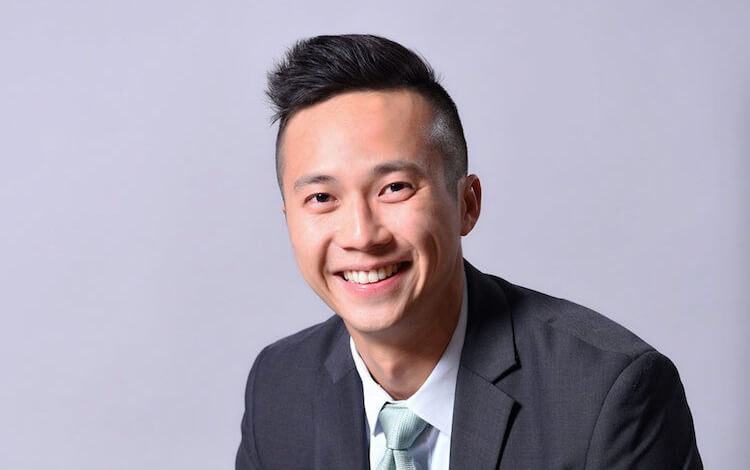
Who: Kwun Phite Consunji Lock, CEO
School: CEIBS, class of 2019
Valuation: It’s a self-funded project, with no external evaluators, but it’s about $10-20 million.
Investment: Undisclosed.
What is your business and what does it do?
BXB Exchange is a financial and blockchain technology company. We empower users by providing powerful financial tools that are simplified, fun, and easy to understand. Our mission is to make trading accessible to the average person and the retail trader.
How has your MBA helped you develop your business? How did the idea come about?
I originally had the idea when I was working my first trading job after college. There were so many tools available to institutional traders that gave them an edge in the market, but they were inaccessible for a lot of people.
Blockchain and crypto allowed me to build these tools, to make them easier and more accessible, and to create a better trading environment focused on fairness, which could help give both retail traders and the average person the upper hand. In short, we reversed the narrative, meaning professional traders no longer had the advantage.
The CEIBS MBA has allowed me to better understand how to run an international business, from fine-tuning strategy to operational management. The most important thing was learning how to build up strong business fundamentals to fit multiple markets.
Where are you at right now? What are your plans for the future?
I’m currently traveling the world, promoting and growing the business. The world of blockchain and crypto never sleeps and has no boundaries—something which makes it so unique and interesting. Every day we are continuously iterating and updating our product lines to make trading as accessible as possible.
We’ve got a lot of fun things planned, and we are very excited for the future.
Skwire
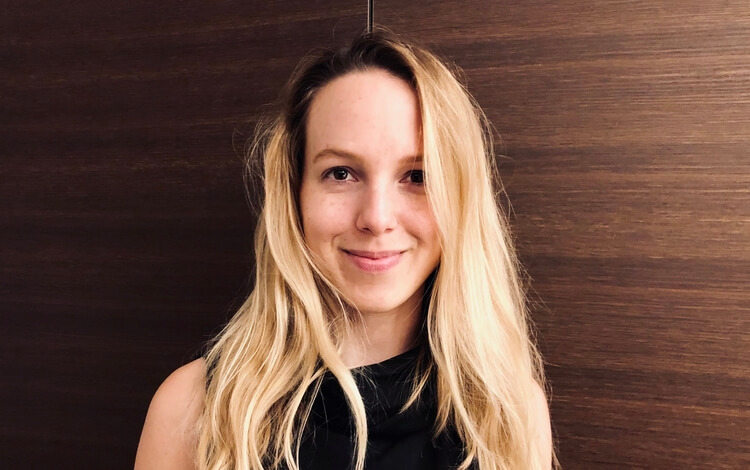
Who: Elisabeth Kohlbach, cofounder and CEO
School: London Business School (LBS), class of 2018
Valuation: TBC
Investment: Undisclosed
What is your business and what does it do?
Skwire is tech-first real estate investment. We use big data and tech innovations to make high-yield investments scalable and accessible for institutional investors. Our first investment product is a diversified short-let fund with 9% unlevered net yield.
How has your MBA helped you develop your business? How did the idea come about?
The idea emerged when I moved to a tiny London flat, annoyed that my father had decided against buying in Notting Hill in the 1970s because the “area will never be nice”. If I could use data science to tell major fashion trends from fads in my pre-MBA job, why not do the same with real estate investments?
I started Skwire during my MBA at London Business School. Success in LBS’s pre-accelerator programme Launchpad and its Entrepreneurship Summer School (ESS), interest from investors, and my mentor's support and network gave me the confidence to focus on my venture post-MBA.
Where are you at right now? What are your plans for the future?
We launched our first, proof-of-concept investment product six months after receiving VC seed investment. It’s a high-yield real estate investment fund offering diversified UK rental income in a completely hands-off product suitable for High Net Worth individuals and institutional investors.
We're currently working on creating a scaled-up version of this product suitable for larger ticket sizes. Ultimately, we want to be able to determine the yield and therefore value of any property on the market.
Category: Food & Drink
Talar
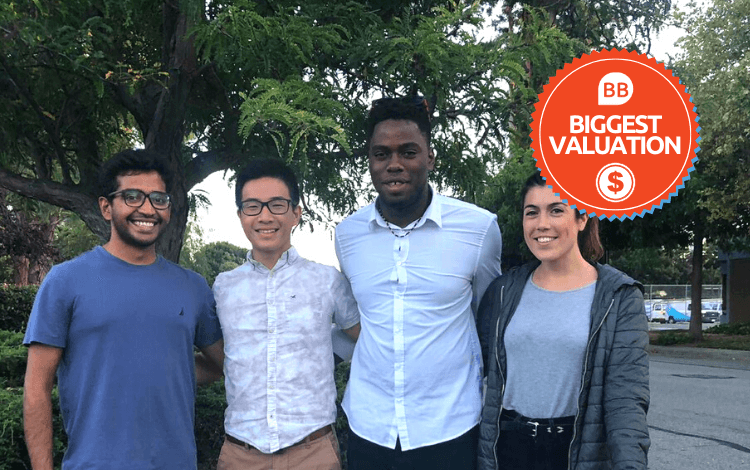
Who: Anuraag Nallapati, cofounder (pictured left)
School: Stanford Graduate School of Business, class of 2019
Valuation: $13.5M
Investment to date: $2.8M
What is your business and what does it do?
Talar manages your weekly shopping list and shop for you from as many stores you like. We come home once a week and place products away in your kitchen (literally). In a nutshell, we're trying to create the magical experience of your fridge filling up without you wasting precious time at the supermarket.
How has your MBA helped you develop your business? How did the idea come about?
We are a very diverse team. We were able to come together because there was implicit trust in capabilities as all of us come vetted by Stanford.
The program helped us empathize and work effectively with multiple thinking styles through courses like Touchy Feely or Leadership Labs. There were an incredible number of opportunities to learn about entrepreneurship. The business school also offers easier access to talent, funding, and advisors compared to anywhere else.
The idea came about when Anna and Chad started working together on a similar idea for Startup Garage and roped me in for brainstorming sessions.
Where are you at right now? What are your plans for the future?
At the GSB, we also met our fourth co-founder Will, a precocious talent who dropped out of Stanford Computer Science to start the company. We got into the Y Combinator program for the summer while at school which concluded recently.
We are serving households in San Francisco, Oakland, and Palo Alto. We are working with a focus on reducing food waste, and packaging for food significantly and are uniquely positioned to have the most impact on this problem.
We plan to expand our service primarily to young dual-income families who cook or have kids as we believe they have the most significant pain point with managing groceries.
Elenita Mezcal

Who: Jordan Dil, cofounder (pictured left)
School: UCLA Anderson School of Management, class of 2019
Valuation: We just raised money on a convertible note with a $4.5M cap, so ~$4.5M.
Investment: Roughly $1.1M
What is your business and what does it do?
Our business is called Elenita Mezcal. We are launching a ready-to-drink mezcal cocktail in a can that uses artisanal mezcal distilled in Oaxaca, natural flavors and juices, and carbonated water.
The idea combines two of the fastest-growing spirits categories in the US—mezcal and ready-to-drink cocktails—into one product.
How has your MBA helped you develop your business? How did the idea come about?
Our business was developed through the Business Creation option of our capstone project at UCLA Anderson. The framework of the program allowed us to really develop the idea into something that turned into a great opportunity and feasible business.
The idea came about through identifying that mezcal was the fastest-growing spirit in the US and then understanding that the best way to differentiate our product and have a real competitive advantage would be through putting it in a premixed cocktail in a can.
Where are you at right now? What are your plans for the future?
We are currently lining up our production in Mexico and are launching in the LA market this fall. Our plan is to really prove traction in the Southern California market over the next 6-12 months before expanding geographically.
We believe this product will be the go-to beverage for anybody looking to drink premium mezcal in casual social settings, where they may not have a bartender there to make a complex cocktail.
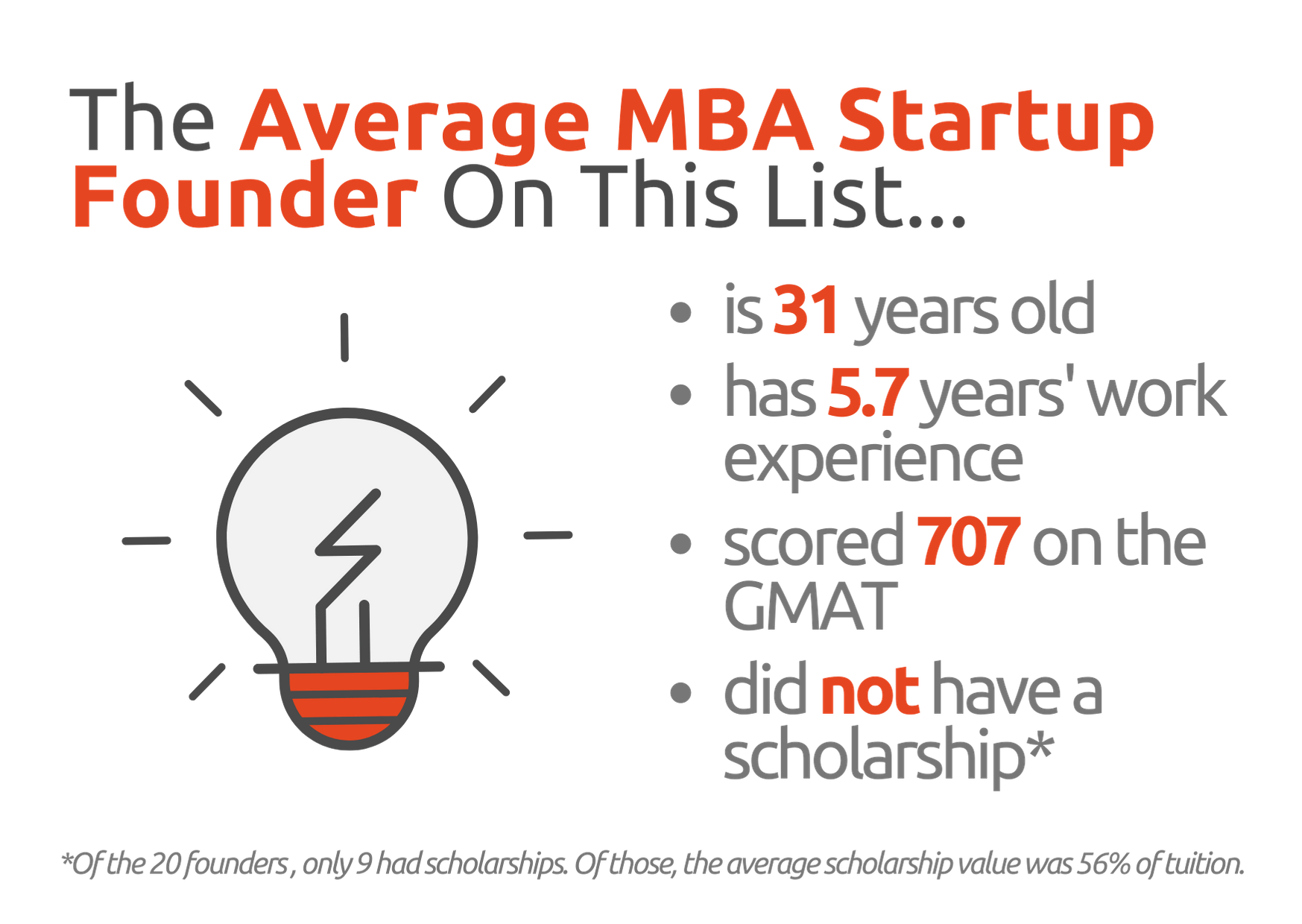
Category: HR & Recruitment
Revelio Labs
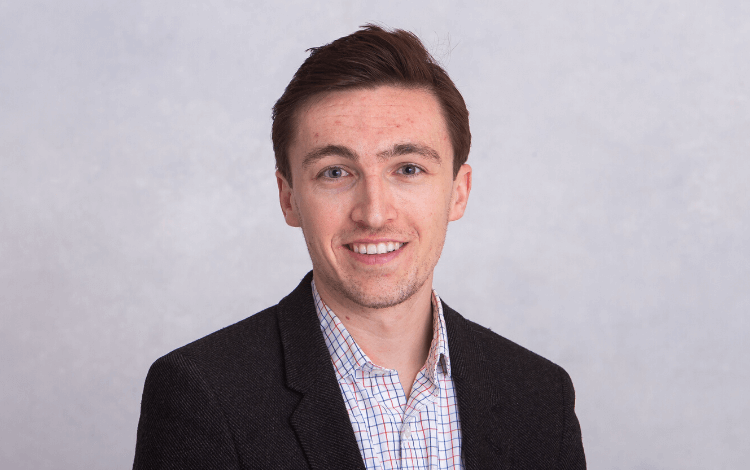
Who: Maxwell Gove, cofounder
School: NYU Stern School of Business, class of 2018
Valuation: TBC
Investment: We've raised a small amount of initial funds from friends and family.
What is your business and what does it do?
Revelio Labs provides an in-depth view into the workforces of companies around the world by leveraging advancements in AI technologies to turn hundreds of millions of online profiles, resumes, and job postings into clear insights that investors, HR, and other leaders can use to make the best decisions related to talent.
How has your MBA helped you develop your business? How did the idea come about?
My MBA undoubtedly gave me the foundation I needed to help launch and run our business, and I routinely think back to the pieces of wisdom I heard in the classroom.
But the help I've received also didn't stop on graduation day. NYU Stern is incredibly supportive of its alumni in their entrepreneurial endeavors. We've taken part in a number of initiatives at Stern—including the $300K Entrepreneurs Challenge and the Stern Venture Fellows program—that have helped us develop the business and have connected us to some incredible advisors that we can turn to as we continue to grow.
Where are you at right now? What are your plans for the future?
We’re still in the early days at Revelio Labs, but I’m also proud to say that, over the last year or so, we’ve made great strides in launching our product and acquiring paying clients.
We will be participating in an accelerator program in NYC throughout the fall, where we’ll be focusing on building out our team, improving our product, and ramping up our sales efforts. I couldn't be more excited about what the future holds for us.
81 Cents

Who: Jordan Sale, cofounder
School: University of California at Berkeley, Haas School of Business, class of 2019
Valuation: TBC
Investment: We’ve received over $25,000 in non-dilutive grants as well as a $25,000 SAFE note from Rough Draft Ventures, the student arm of General Catalyst.
What is your business and what does it do?
81cents helps women and underrepresented minorities ensure they're being paid market rate by sourcing compensation data and personalized career advice from hiring managers and recruiters in relevant fields.
81cents has helped 190+ individuals find more than $2M in additional compensation and has been featured by Forbes and ABC News.
How has your MBA helped you develop your business? How did the idea come about?
I had a tough negotiation early in my career which prompted me to learn more about negotiating and talk to my peers about their experiences. I realized that even the smartest people often have no idea how to negotiate and figuring out your worth is almost impossible.
My program gave me the time, support, and preliminary funding to get 81cents off the ground. Haas offered scholarships and mentorship from alumni founders for students interested in using their summer internship to start a company. Looking back, those three internship months were pivotal—I was able to conduct over 50 customer interviews and build an MVP.
Where are you at right now? What are your plans for the future?
To date, we’ve worked with over 190 individuals and have partnered with organizations like Sista Circle, Black Women in Tech and Tech Ladies to co-create content and expand our reach. We’re also currently in the Venture Accelerator at UCLA Anderson School of Business, which has been hugely valuable.
We’re also heavily focused on recruiting reviewers who take a few minutes a month to review compensation packages of women and underrepresented minorities more junior in their fields.
Looking ahead we’re excited to expand beyond tech to other industries with serious pay gaps as well as add smart, passionate individuals to our team.
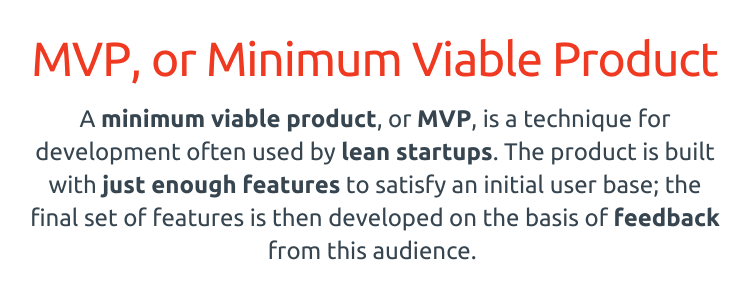
Moonshot Diversity & Inclusion

Who: Sophie Van Gool, founder
School: Esade Business School, class of 2019
Valuation: TBC
Investment: None so far—we’re bootstrapping with revenues.
What is your business and what does it do?
Moonshot is on a mission to close the gender and diversity gap in the workplace. We help organizations that want to attract and promote the best talent with analytics, strategy, and training to build a more inclusive workplace and achieve the benefits of diverse teams.
How has your MBA helped you develop your business? How did the idea come about?
Before my MBA, I was working at the Boston Consulting Group. In my office, there was only one woman in leadership (4% of the total). I worked on an internal project to improve this.
While doing my MBA I saw that many companies across industries and countries struggle with this. I also noticed that most solutions were coming from an HR /coaching angle, and figured out there would be an opportunity for a data-driven solution.
During an Entrepreneurship class I developed the idea and before I knew it, it became a business with real clients.
Where are you at right now? What are your plans for the future?
After the successful pilots during the MBA, we’re now focusing on business development: acquiring more clients and figuring out our product-market fit. We’re testing multiple products (an analytics tool, in-company trainings, process redesign, etc.) that help companies reduce unconscious bias and encourage more data-driven decision making.
We want to become the number one Diversity & Inclusion solution provider in the world (starting with Europe).
In the future I also want to develop a B2C product and build a platform to help women and underrepresented groups find a job they love and negotiate the salary they deserve
Kido Dynamics
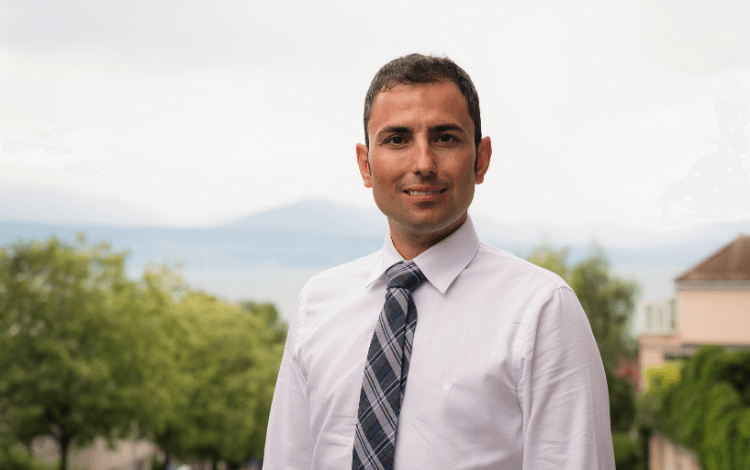
Who: Ignacio Barrios, cofounder and CEO
School: IMD Business School, class of 2015
Valuation: $8-10M
Investment: $2.5M (including equity, loans, and grants).
What is your business and what does it do?
Kido Dynamics provides the most advanced insights to make cities smarter. Our tools are used by companies, governments, and public institutions to understand people’s mobility patterns.
Good-quality travel data are needed both to portray existing situations and to help identify problems related to the operation of today’s increasingly complex mobility ecosystems.
How has your MBA helped you develop your business? How did the idea come about?
IMD’s MBA program teaches you a whole set of tools to navigate complex business situations. Resiliency, leadership, delegation, teamwork, time management, communication, flexibility—all within a multicultural environment—are critical skills I use in my day-to-day business. Furthermore, I created a powerful network that helped me, first to meet my cofounder, and second to meet some of my current team members.
When I met my co-founder Alberto, he was looking for someone with business vision and management experience, so it was a great opportunity to jump into an exciting project where I could also leverage my previous experience in mobility.
Where are you at right now? What are your plans for the future?
We have recently been awarded with an H2020 Grant worth $1.6M, we have grown our team to 14 people, and we have commercial activities in 6 countries.
We have just completed the largest mobility analysis ever made in Spain—and I would say worldwide—with more than 4 billion trips analysed over a year.
We are planning to keep on expanding our business capabilities to new geographies and consolidate commercial activities in LATAM and Middle East, where we expect to contribute to the World Cup 2022 in Qatar as a mobility analytics provider.
Category: Lifestyle
Hamlit
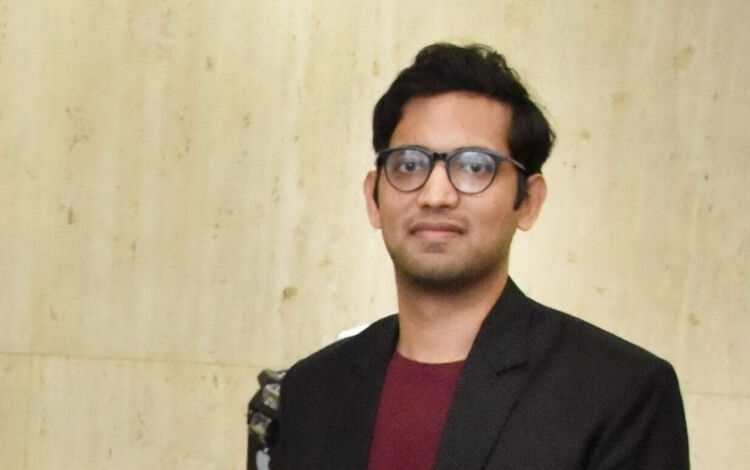
Who: Pranshu Sharma, founder
School: National University of Singapore Business School (NUS), class of 2019
Valuation: Confidential
Investment: Over $100K
What is your business and what does it do?
Hamlit’s vision is to create a safer everyday ride for millions of two-wheeler riders around the world.
We offer a machine learning-powered hardware attachment, which senses blind spot areas around vehicles and warns riders of any danger through intuitive light notification. This reduces situational unawareness, empowering the rider to avoid accidents.
How has your MBA helped you develop your business? How did the idea come about?
Early this year a friend of mine was involved in a road accident and he isn’t the only one. In India alone, around 400 people die in road accidents every day, and the majority of these people are on two-wheelers.
After multiple iterations and customer interviews we came up with Hamlit—the world’s first smart danger notifier created specifically for two-wheeler riders.
I am an engineer by education, so I have an analytical approach towards problems. But while running my first startup back in India, I realized that business is a blend of analytics and abstraction—you must make decisions with multiple unknown variables.
The MBA helped me navigate this space of unknowns through practical courses like Design Thinking, E&I, and Venture Capital.
Where are you at right now? What are your plans for the future?
We have recently raised pre-seed funding from the NUS-GRIP program and have won another two significant startup grants that will help us manufacture our product at scale.
We already have some pre-orders and are looking for two-wheeler enthusiasts who can help us test our prototype. We plan to launch Hamlit’s first sale through a crowdfunding campaign early next year.
Living Lab

Who: Mitchel Gorecki, cofounder and CEO (pictured left)
School: Duke University, Fuqua School of Business, class of 2018
Valuation: Confidential
Investment: $2.7M
What is your business and what does it do?
LivingLab is a platform that makes shared living easy. We use technology to match individuals to combinations of bedrooms and roommate groups in beautiful homes. Each home includes furnishings, wifi, utilities, housekeeping, and community events.
How has your MBA helped you develop your business? How did the idea come about?
An MBA from Fuqua has been helpful for three reasons:
1. This is where I met my cofounders, Patrick Wickham and Colin Tai, without which we would not have a company.
2. The core knowledge around topics such as venture capital and lasting competitive advantages have been instrumental.
3. Access to the Duke MBA alumni network, which is incredibly strong and supportive, has helped guide the company.
The idea came from experiencing the problem firsthand. After shuffling between various shared housing arrangements, it became clear that this could become a standalone company that truly creates value for its customers.
Where are you at right now? What are your plans for the future?
We have launched our product, and are currently serving the Raleigh/Durham market. We recently closed a round of financing with the intent of scaling the regions we serve.
Trulli
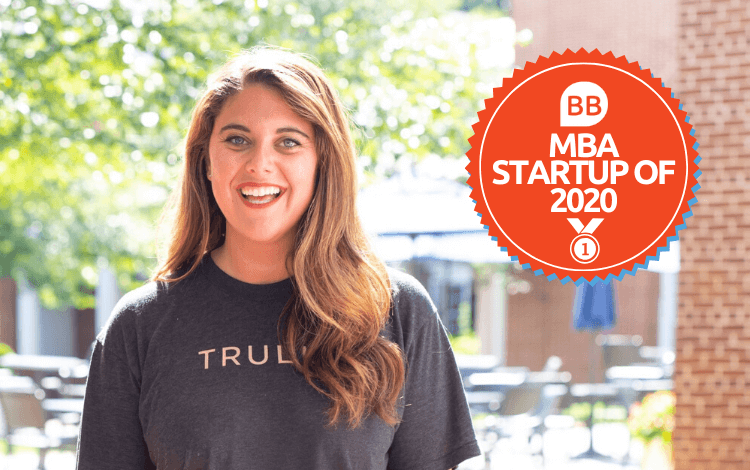
Who: Amanda Joseph, founder and CEO
School: University of Virginia, Darden School of Business, class of 2019
Valuation: TBC
Investment: $50K
What is your business and what does it do?
Trulli is the platform for travelers to plan trips based on recommendations from the people they trust most: their friends. Users can search a destination to see their friends who have been and what they loved doing there.
How did the idea come about?
The idea for Trulli arose from planning a four-month trip around the world before starting my MBA.
I was overwhelmed by the amount of information available and unsure of who to trust or how to account for differences in taste. I found myself faced with the analysis paralysis that comes with thirty open browser tabs.
On my trip, I realized my favorite moments frequently came from friends’ recommendations, but I struggled to know who to ask (‘Did I see an Instagram last year of you in Japan?’).
I arrived at Darden with the goal to simplify travel planning through the lens of personal recommendations.
How has your MBA helped you develop your business?
Darden has been foundational in building Trulli. I refined my idea through boundary-pushing classes like Design Thinking and Effectuation, met inspiring mentors, and won grants through the iLab Incubator and Entrepreneurship Cup.
Darden also introduced me to Trulli’s ideal users: MBAs. As any MBA knows, we travel a lot—$21K average social travel spend over two years! Trulli allows students to foster connections and benefit from their network’s knowledge.
Where are you at right now? What are your plans for the future?
Trulli is live and features hundreds of inspiring travelers and itineraries from MBAs from Darden, Columbia, and Fuqua.
This fall, Trulli will launch at 10 additional business schools and introduce its mobile app. By mid-2020, I plan to expand to undergrad campuses with a focus on study abroad.
Ultimately, I intend to incorporate booking functionality and build out an influencer marketplace to make Trulli the all-in-one solution for a new generation looking for personalized, trustworthy travel guidance.
Category: Nonprofit
Business Services Collective

Who: Kyle Johnson, cofounder (pictured right)
School: University of Chicago Booth School of Business, class of 2019
Valuation: N/A
Investment: After an initial research grant to develop a business model incubated by The Dividend Project, we have raised $40,000 in grant support to fund our MVP.
What is your business and what does it do?
The Business Services Collective works with entrepreneurs of color in the construction trades to create a shared back office.
By lowering the cost to delegate services like estimation, project management, and bookkeeping, we enable entrepreneurs to delegate their paperwork and focus on growing their business.
How has your MBA helped you develop your business? How did the idea come about?
My cofounder and I had each worked for years in economic development nonprofits before attending business school. We worked with hundreds of diverse entrepreneurs who had difficulty accessing capital and maintaining reliable workers. Digging deeper into these issues, our conversations with business owners revealed these constraints were rooted in unreliable back office operations.
Our MBAs provided the tools and networks to bridge the worlds of community development and sustainable business design. Booth’s entrepreneurship programming, including the Social New Venture Challenge, pushed our startup to stay focused on customer discovery to ensure we understood the problem and tested our solution.
Where are you at right now? What are your plans for the future?
This fall, we’re piloting an affordable estimation service (the process of assembling project bids) by pairing construction businesses with architecture students mentored by experienced professionals.
In 2020 we will expand to serve diverse contractors entering clean energy construction projects, through our partnership with Elevate Energy and SOUL, Inc. This MVP will provide evidence for philanthropic funding to scale throughout Chicagoland. We’ll develop a full suite of back office services (bookkeeping, invoicing, customer service) by working with our members as their needs emerge.
Ultimately, we want the businesses we serve to feel ownership and direct our development as a community asset.
Maziwa
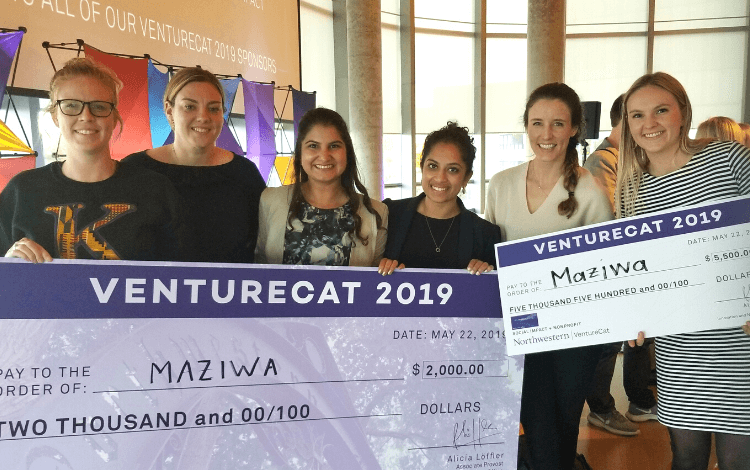
Who: Sahar Jamal, founder (pictured center left)
School: Northwestern University’s Kellogg Graduate School of Management, class of 2019
Valuation: N/A
Investment: $132,500 total in grants and donations.
What is your business and what does it do?
Maziwa is the only breast pump specifically designed for working women in developing markets because it is discreet, battery-powered, and includes a storage cooler.
We believe mothers should not have to choose between staying at home to feed their baby and going to work in order to feed their family.
How has your MBA helped you develop your business? How did the idea come about?
My Kellogg MBA was pivotal in launching this business. Professor Kara Palamountain’s Medical Devices in Developing Markets class introduced me to the NEST360 project to improve neonatal care.
As the Net Impact Club’s co-president, I was surrounded by a community of like-minded, impact-driven business students.
The funding for social impact internships exposed me to the in-market realities of operating a social enterprise at Jacaranda Health last summer.
Kellogg’s Zell Fellows and Northwestern’s Garage Residency programs for entrepreneurs provided me with mentorship and resources to develop my idea.
Finally, Kellogg’s Social Entrepreneurship Award gave me seed funding to launch Maziwa full-time.
Where are you at right now? What are your plans for the future?
Now that I have graduated, I will be moving to Nairobi, Kenya to pursue my business full-time.
My first priority is to continue refining my product prototype based on consumer feedback while I am in-market. I also hope to build out my full-time technical team of engineers. I look forward to solidifying partnerships with maternity clinics, employers, early childcare centers, governmental associations, and global health organizations to support this complex work.
Finally, while I have been fortunate to receive funding to support my first year of operation, I will be continuing to fundraise until the business can be self-sustaining.
Category: Parenting & Family
ReMana

Who: Lindsay McCurren, cofounder and CEO
School: Harvard Business School, class of 2019
Valuation: TBC
Investment: Undisclosed.
What is your business and what does it do?
ReMana is a consumer goods company that is bringing innovative products to today’s modern parents.
We are starting by reinventing breastmilk storage with a more ideal solution for mom, saving her time, spilled milk and wasted plastic. We believe products should deliver the quality, convenience, and sustainability that parents value.
How has your MBA helped you develop your business? How did the idea come about?
There have been so many benefits and skills that pursuing my MBA at Harvard Business School afforded me—from tangible lessons in the classroom to eligibility for incubators and accelerators.
It’s crucial for a founder to be well-versed in the fundraising process, early sales and marketing, and handling the emotional rollercoaster of an early stage venture—all of which I focused on at HBS.
I was also connected to amazing mentors through programs such as the iLab VIP and the Rock Accelerator. The idea came from a personal pain-point I experienced and has grown under the guidance of so many resources.
Where are you at right now? What are your plans for the future?
With the funding we just received, we are producing prototypes of our first product in order to begin beta-testing with users. We are hopeful that the product is well-received by those women trying it, bringing us the confidence we need to move forward with production.
However, regardless of the outcome, we are excited to receive any feedback that will bring us closer to a commercial launch. We are actively seeking beta users at this time and hope to have women using the product soon. In the future we will look to raise a more substantial round of funding.
CaroCare

Who: Karina Akib, cofounder (pictured right)
School: MIT Sloan School of Management, class of 2019
Valuation: TBC
Investment: TBC
What is your business and what does it do?
CaroCare is a platform designed to support new families from the minute they leave the hospital, addressing their physical, emotional and educational needs in the critical 6-8 weeks after birth through a combination of in-home and remote care with a curated provider platform and 24/7 access to professional advice.
How has your MBA helped you develop your business? How did the idea come about?
CaroCare is currently part of MIT’s flagship accelerator, DeltaV, which is pushing us to think deeply about all aspects of the business. We are accountable to a board made up of experienced entrepreneurs, business leaders, and healthcare experts that we meet with monthly to advise us and challenge our thinking.
Steph, my cofounder, and I came up with the idea after we compared our friends’ experiences of giving birth in the US and other parts of the world including Australia (where I’m from) and Europe. We were shocked by the lack of support in the US compared to overseas and felt compelled to solve the problem.
Where are you at right now? What are your plans for the future?
I’m based in Boston right now working on CaroCare. We are coming towards the end of MIT’s accelerator DeltaV. Steph and I plan to continue with CaroCare full-time after seeking some angel round funding to help kickstart the business.
Devie

Who: Puja Balachander, cofounder
School: University of Oxford, Saïd Business School, class of 2019
Valuation: N/A
Investment: N/A
What is your business and what does it do?
Devie is a social enterprise with a mission to eliminate gaps in early childhood development between children from lower- and higher-income families.
We do this through Devie, a virtual coach that empowers every parent to support their child’s cognitive and socio-emotional development through daily 5-10 minute instant message conversations.
How has your MBA helped you develop your business? How did the idea come about?
I met my co-founder, a fellow MBA, during launch week and we almost immediately started working together to research the problem of inequality in early childhood. As we researched and prototyped, we honed in on parenting as the most effective lever for change, and on the design considerations that eventually led to Devie.
MBA programs and colleagues facilitated this process at every step. Classmates helped us synthesize our research, and Oxford’s [entrepreneurship resources] offered us opportunities to refine and prototype our idea, access mentors, pitch, and access funding and feedback.
Where are you at right now? What are your plans for the future?
I am now based in London and working on Devie full-time.
My plan for the future is to continue as CEO of Devie, to develop and grow the product so that every parent in the UK and beyond is able to give their child the opportunity to start school and life with an equal chance for success.
Merry Go Rounds
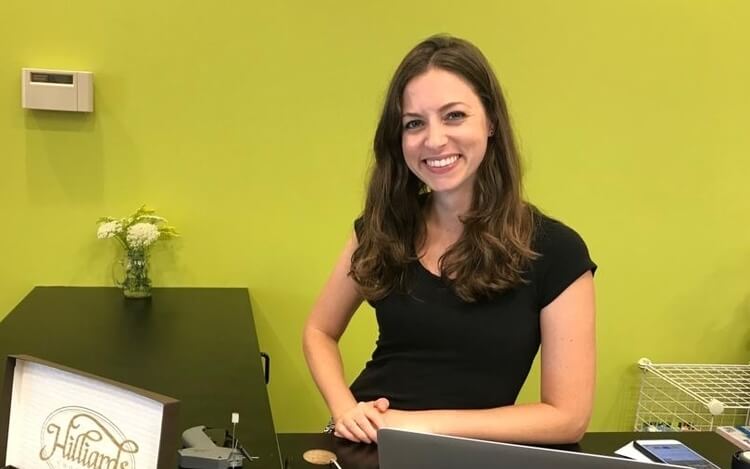
Who: Melissa Mazzeo
School: Yale School of Management
Valuation: N/A
Investment: N/A
What is your business and what does it do?
Merry Go Rounds is a children’s resale marketplace that makes shopping for kids' clothes more circular, sustainable, and fun. We sell through physical shops, an online store, Hand Me Up subscription boxes, and pop-up events.
How has your MBA helped you develop your business?
I came to SOM knowing I wanted to work on this business, but I had no idea where to start. Meeting the classmates who became my co-founders, Cyndi and Jatin, helped move it from idea stage to execution stage.
It’s been really useful to take classes while working on the venture so I can apply knowledge in real time, rather than just absorbing abstract concepts. And I can’t overstate the value of the mentorship opportunities and programming at SOM and Yale overall. I’ve met so many brilliant, kind, and passionate people who are genuinely invested in helping the business succeed.
Where are you at right now? What are your plans for the future?
At first, I was working on this business as a separate startup inspired by my mom’s brick-and-mortar store. Since then, she and I decided to join forces, so I’ll become CEO of the existing company after I graduate in May.
Building on the family business, rather than launching something brand new, opens up a lot of opportunities: an existing customer base and a proven business model, to name two. This past summer, we opened a second brick-and-mortar shop and launched our online store. The next step is to launch our Hand Me Up subscription boxes, coming soon!
METHODOLOGY
For our MBA startups list, we reached out to the world's top 25 business schools as ranked by the Financial Times in 2019. We requested nominations for one startup per school which was launched by an MBA graduate within the last calendar year. We've only featured schools who responded to our survey.
All values such as valuations and investment to date are were reported to us by the founders themselves. Where a confirmed valuation is forthcoming, it is noted as TBC in this list; for startups where valuation is not applicable, for instance in the case of nonprofits, this has been marked N/A.
This feature was put together by the all-star BusinessBecause editorial team: Amy Hughes, Bethany Garner & Jasmine Lee-Zogbessou.



